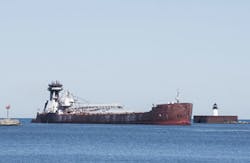Fracking wastewater may be moved by barges under US Coast Guard proposal
The U.S. Coast Guard may allow drilling companies to ship fracking wastewater by barges via the country's rivers and lakes under a new proposal it announced Wednesday.
The possibility of moving fracking wastewater by waterways has been disputed for years and the Coast Guard has been examining the matter for almost two years, after it was asked by its Pittsburgh office to look into the potential advantages and disadvantages of the method.
The proposal will now be open to public comment for a period of 30 days. If it is approved, drilling companies will be able to ship wastewater on barges, which is a cheaper way than trucks or rail. However, before being granted permission to do so, companies will have to provide samples from the wastewater they are going to ship, so that a number of tests can be carried out at state-certified laboratories, where measurements of radioactivity levels, pH, bromides and other toxic materials will be taken.
RELATED: Michigan to introduce new fracking rules
Under the proposed rules the barges will also have to be checked on a regular basis, as accumulation of radioactive particles from wastewater may be harmful to workers.
At present, wastewater that is accumulated in the process of shale gas extraction is either stored at drilling sites or is moved by truck or rail to wastewater treatment plants or underground wells, the Huffington Post reported.
